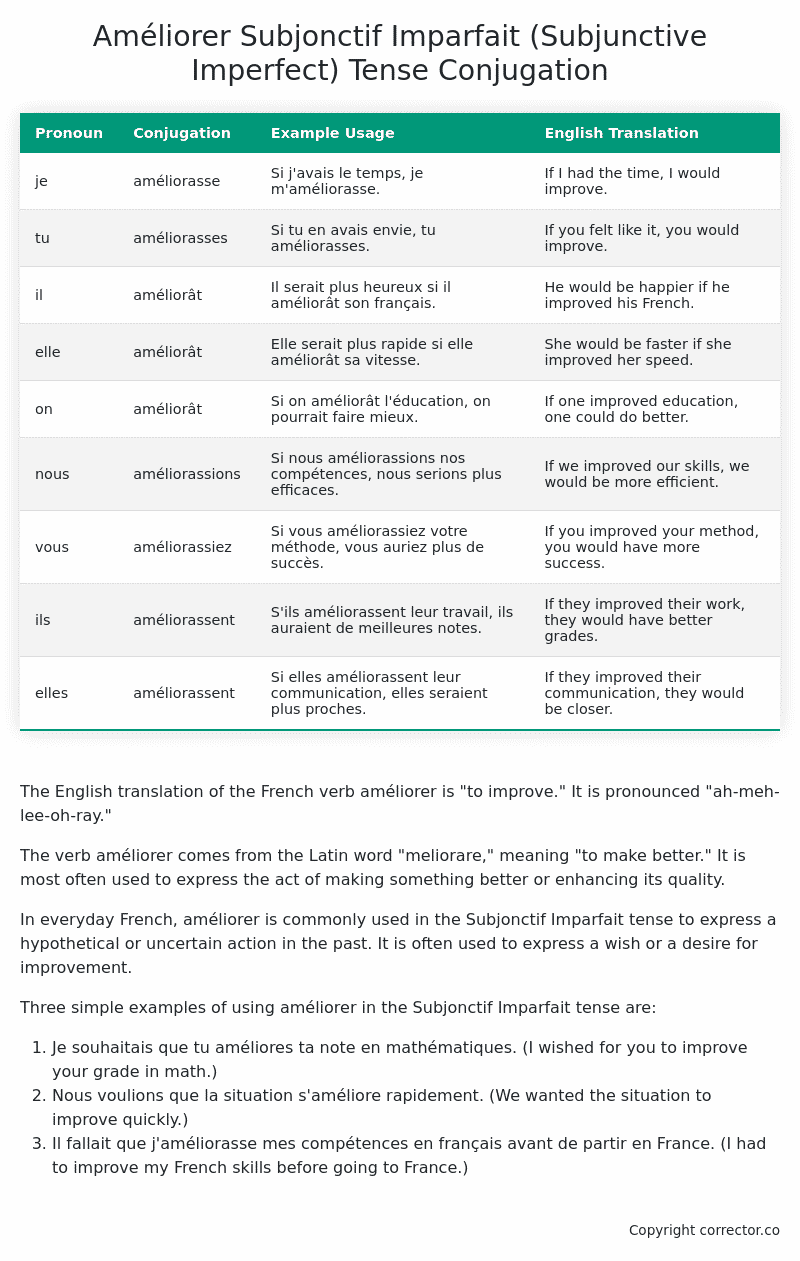Subjonctif Imparfait (Subjunctive Imperfect) Tense Conjugation of the French Verb améliorer
Introduction to the verb améliorer
The English translation of the French verb améliorer is “to improve.” It is pronounced “ah-meh-lee-oh-ray.”
The verb améliorer comes from the Latin word “meliorare,” meaning “to make better.” It is most often used to express the act of making something better or enhancing its quality.
In everyday French, améliorer is commonly used in the Subjonctif Imparfait tense to express a hypothetical or uncertain action in the past. It is often used to express a wish or a desire for improvement.
Three simple examples of using améliorer in the Subjonctif Imparfait tense are:
- Je souhaitais que tu améliores ta note en mathématiques. (I wished for you to improve your grade in math.)
- Nous voulions que la situation s’améliore rapidement. (We wanted the situation to improve quickly.)
- Il fallait que j’améliorasse mes compétences en français avant de partir en France. (I had to improve my French skills before going to France.)
Table of the Subjonctif Imparfait (Subjunctive Imperfect) Tense Conjugation of améliorer
| Pronoun | Conjugation | Example Usage | English Translation |
|---|---|---|---|
| je | améliorasse | Si j’avais le temps, je m’améliorasse. | If I had the time, I would improve. |
| tu | améliorasses | Si tu en avais envie, tu améliorasses. | If you felt like it, you would improve. |
| il | améliorât | Il serait plus heureux si il améliorât son français. | He would be happier if he improved his French. |
| elle | améliorât | Elle serait plus rapide si elle améliorât sa vitesse. | She would be faster if she improved her speed. |
| on | améliorât | Si on améliorât l’éducation, on pourrait faire mieux. | If one improved education, one could do better. |
| nous | améliorassions | Si nous améliorassions nos compétences, nous serions plus efficaces. | If we improved our skills, we would be more efficient. |
| vous | améliorassiez | Si vous améliorassiez votre méthode, vous auriez plus de succès. | If you improved your method, you would have more success. |
| ils | améliorassent | S’ils améliorassent leur travail, ils auraient de meilleures notes. | If they improved their work, they would have better grades. |
| elles | améliorassent | Si elles améliorassent leur communication, elles seraient plus proches. | If they improved their communication, they would be closer. |
Other Conjugations for Améliorer.
Le Present (Present Tense) Conjugation of the French Verb améliorer
Imparfait (Imperfect) Tense Conjugation of the French Verb améliorer
Passé Simple (Simple Past) Tense Conjugation of the French Verb améliorer
Passé Composé (Present Perfect) Tense Conjugation of the French Verb améliorer
Futur Simple (Simple Future) Tense Conjugation of the French Verb améliorer
Futur Proche (Near Future) Tense Conjugation of the French Verb améliorer
Plus-que-parfait (Pluperfect) Tense Conjugation of the French Verb améliorer
Passé Antérieur (Past Anterior) Tense Conjugation of the French Verb améliorer
Futur Antérieur (Future Anterior) Tense Conjugation of the French Verb améliorer
Subjonctif Présent (Subjunctive Present) Tense Conjugation of the French Verb améliorer
Subjonctif Passé (Subjunctive Past) Tense Conjugation of the French Verb améliorer
Subjonctif Imparfait (Subjunctive Imperfect) Tense Conjugation of the French Verb améliorer (this article)
Subjonctif Plus-que-parfait (Subjunctive Pluperfect) Tense Conjugation of the French Verb améliorer
Conditionnel Présent (Conditional Present) Tense Conjugation of the French Verb améliorer
Conditionnel Passé (Conditional Past) Tense Conjugation of the French Verb améliorer
L’impératif Présent (Imperative Present) Tense Conjugation of the French Verb améliorer
L’infinitif Présent (Infinitive Present) Tense Conjugation of the French Verb améliorer
Struggling with French verbs or the language in general? Why not use our free French Grammar Checker – no registration required!
Get a FREE Download Study Sheet of this Conjugation 🔥
Simply right click the image below, click “save image” and get your free reference for the améliorer Subjonctif Imparfait tense conjugation!

Améliorer – About the French Subjonctif Imparfait (Subjunctive Imperfect) Tense
Formation
Common Everyday Usage Patterns
Interactions with Other Tenses
Subjonctif Présent
Indicatif Passé Composé
Conditional
Conditional Perfect
Summary
I hope you enjoyed this article on the verb améliorer. Still in a learning mood? Check out another TOTALLY random French verb conjugation!


